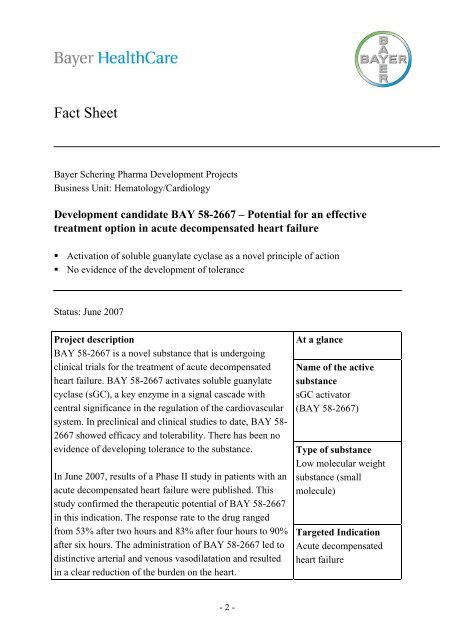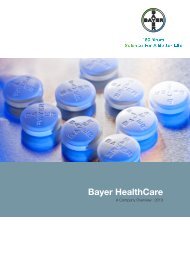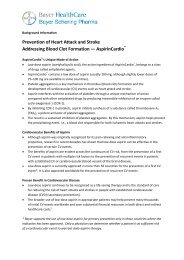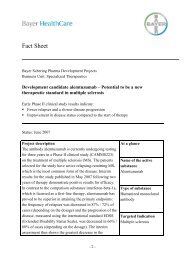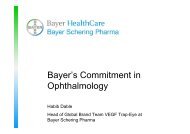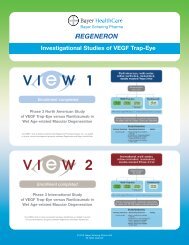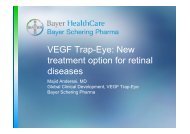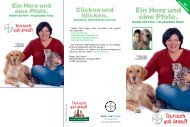Fact Sheet - Bayer HealthCare
Fact Sheet - Bayer HealthCare
Fact Sheet - Bayer HealthCare
You also want an ePaper? Increase the reach of your titles
YUMPU automatically turns print PDFs into web optimized ePapers that Google loves.
<strong>Fact</strong> <strong>Sheet</strong><br />
<strong>Bayer</strong> Schering Pharma Development Projects<br />
Business Unit: Hematology/Cardiology<br />
Development candidate BAY 58-2667 – Potential for an effective<br />
treatment option in acute decompensated heart failure<br />
Activation of soluble guanylate cyclase as a novel principle of action<br />
No evidence of the development of tolerance<br />
Status: June 2007<br />
Project description<br />
BAY 58-2667 is a novel substance that is undergoing<br />
clinical trials for the treatment of acute decompensated<br />
heart failure. BAY 58-2667 activates soluble guanylate<br />
cyclase (sGC), a key enzyme in a signal cascade with<br />
central significance in the regulation of the cardiovascular<br />
system. In preclinical and clinical studies to date, BAY 58-<br />
2667 showed efficacy and tolerability. There has been no<br />
evidence of developing tolerance to the substance.<br />
In June 2007, results of a Phase II study in patients with an<br />
acute decompensated heart failure were published. This<br />
study confirmed the therapeutic potential of BAY 58-2667<br />
in this indication. The response rate to the drug ranged<br />
from 53% after two hours and 83% after four hours to 90%<br />
after six hours. The administration of BAY 58-2667 led to<br />
distinctive arterial and venous vasodilatation and resulted<br />
in a clear reduction of the burden on the heart.<br />
- 2 -<br />
At a glance<br />
Name of the active<br />
substance<br />
sGC activator<br />
(BAY 58-2667)<br />
Type of substance<br />
Low molecular weight<br />
substance (small<br />
molecule)<br />
Targeted Indication<br />
Acute decompensated<br />
heart failure
- 2 -<br />
A Phase IIb study in this indication is planned to start this<br />
year.<br />
The medical and physiological background<br />
Soluble guanylate cyclase (sGC) is a key enzyme in a<br />
signal cascade that has central significance in the regulation<br />
of a large number of physiological processes. It is activated<br />
by the endogenously formed gas nitrogen monoxide (NO)<br />
and in its active form catalyzes the formation of cyclic<br />
guanosine monophosphate (cGMP). This neurotransmitter<br />
cGMP acts as a "second messenger" and leads, for<br />
example, to the dilatation of vessels, has a blood pressurelowering<br />
effect and mediates tissue-protective effects.<br />
Limited bioavailability of NO or reduced sensitivity to<br />
endogenous NO play a role in various diseases, e.g.<br />
cardiovascular diseases and pulmonary hypertension.<br />
The therapy options for cardiovascular diseases, in which<br />
this signal path (NO sGC cGMP) is adversely<br />
affected or disturbed, are limited. They include the<br />
administration of NO donors, e.g. in the form of glyceryl<br />
trinitrate (nitroglycerin) or substances that prevent the<br />
breakdown of cGMP (inhibitors of the enzyme<br />
phosphodiesterase). The direct NO-independent activation<br />
of the enzyme soluble guanylate cyclase is a novel<br />
principle. To date, no drugs based on this principle are<br />
available.<br />
Acute heart failure<br />
Acute heart failure is the most common cause of hospital<br />
admissions in patients over 65 years of age. There is an<br />
urgent need for improved therapy options for patients with<br />
acute heart failure, as both morbidity and mortality in the<br />
disease are very high. After clinical treatment for the first<br />
time, 20% of patients are readmitted to hospital after one<br />
month, 60% after six to twelve months. 10% of the patients<br />
die within a month, 20-40% in a period between six and<br />
twelve months.<br />
- 3 -<br />
Administration form<br />
Intravenous infusion<br />
Mode of action<br />
Activation of the enzyme<br />
soluble guanylate cyclase<br />
in a signal cascade that<br />
leads to vasodilatation<br />
Status<br />
Phase IIa study<br />
completed (Proof of<br />
Concept)<br />
Start of a Phase IIb<br />
study planned for<br />
2007
- 3 -<br />
Active substance<br />
The sGC activator BAY 58-2667 is a novel low molecular<br />
weight substance in clinical development that acts directly<br />
on the enzyme soluble guanylate cyclase in the signal<br />
pathway NO sGC cGMP (see above). As a result of<br />
the binding of BAY 58-2667 to the enzyme sGC, this is<br />
activated and causes the formation of the second messenger<br />
cGMP, which can mediate the known vasodilator, blood<br />
pressure lowering and tissue-protective effects. BAY 58-<br />
2667 is able to bind to sGC when the enzyme is altered due<br />
to disease, i.e. when a certain component of the enzyme,<br />
the iron-containing haem group, is not present or is present<br />
only in oxidized form. This property is of central<br />
significance for the therapeutic potential of BAY 58-2667,<br />
as normally the endogenous or therapeutically administered<br />
signal molecule NO binds to the reduced haem group.<br />
Preclinical studies have shown that the activation of sGC<br />
takes place independently of the availability of NO.<br />
sGC activators<br />
sGC activators are substances that act directly on the<br />
enzyme soluble guanylate cyclase in the signal pathway<br />
NO sGC cGMP (see above) and activate this.<br />
Whereas the sGC stimulants stimulate the normally<br />
functioning enzyme and increase the effect of NO on the<br />
enzyme, the sGC activators are able to activate the enzyme<br />
when it is altered due to disease and NO can no longer act<br />
on this enzyme.<br />
<strong>Bayer</strong> <strong>HealthCare</strong><br />
<strong>Bayer</strong> <strong>HealthCare</strong>, a subsidiary of <strong>Bayer</strong> AG, is one of the world’s leading, innovative<br />
companies in the healthcare and medical products industry and is based in Leverkusen,<br />
Germany. The company combines the global activities of the Animal Health,<br />
Consumer Care, Diabetes Care and Pharmaceuticals divisions. The pharmaceuticals<br />
business operates under the name <strong>Bayer</strong> Schering Pharma and as <strong>Bayer</strong> <strong>HealthCare</strong><br />
- 4 -
- 4 -<br />
Pharmaceuticals in the US and Canada. <strong>Bayer</strong> <strong>HealthCare</strong>’s aim is to discover and<br />
manufacture products that will improve human and animal health worldwide.<br />
<strong>Bayer</strong> Schering Pharma<br />
<strong>Bayer</strong> Schering Pharma is a worldwide leading specialty pharmaceutical company. Its<br />
research and business activities are focused on the following areas: Diagnostic<br />
Imaging, Hematology/Cardiology, Oncology, Primary Care, Specialized Therapeutics<br />
and Women's Healthcare. With innovative products, <strong>Bayer</strong> Schering Pharma aims for<br />
leading positions in specialized markets worldwide. Using new ideas, <strong>Bayer</strong> Schering<br />
Pharma aims to make a contribution to medical progress and strives to improve the<br />
quality of life.<br />
Research and Development at <strong>Bayer</strong> Schering Pharma<br />
<strong>Bayer</strong> Schering Pharma concentrates its R&D activities on innovative treatment<br />
approaches for diseases with a high unmet medical need to improve patients’ quality of<br />
life and prolong lives. In this context, <strong>Bayer</strong> Schering Pharma focuses on its core<br />
competencies and its many years of experience. Thus, <strong>Bayer</strong> Schering Pharma holds a<br />
leading position in many therapeutic fields: for example, in the treatment of hemophilia<br />
and multiple sclerosis, in contrast media and oral contraception. We are also striving<br />
for a leading position in oncology. With new approaches in cancer therapy, for<br />
cardiovascular diseases, gynaecological therapies and in molecular imaging, <strong>Bayer</strong><br />
Schering Pharma aims to become an innovation leader in these fields. In addition,<br />
<strong>Bayer</strong> Schering Pharma further develops products already on the market in order to<br />
improve their application and/or extend their range of indications.<br />
Contacts:<br />
Dr. Jost Reinhard, Tel.: +49 30 468 15062<br />
E-mail: jost.reinhard@bayerhealthcare.com<br />
Frank Richtersmeier, Tel.: +49 30 468 17661<br />
E-mail: frank.richtersmeier@bayerhealthcare.com<br />
Forward-looking statements<br />
This information contains forward-looking statements based on current assumptions and forecasts made by <strong>Bayer</strong><br />
Group management. Various known and unknown risks, uncertainties and other factors could lead to material<br />
differences between the actual future results, financial situation, development or performance of the company and<br />
the estimates given here. These factors include those discussed in our public reports filed with the Frankfurt<br />
Stock Exchange and with the U.S. Securities and Exchange Commission (including Form 20-F). The company<br />
assumes no liability whatsoever to update these forward-looking statements or to conform them to future events<br />
or developments.


